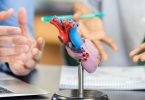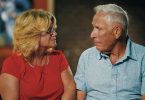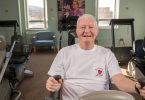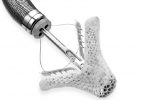Cecile Fink has had good health for most of her 72 years. But when normal daily chores in her South Plymouth household began to leave her short of breath, she knew something was wrong.
“I would go outside to feed the rabbits and chickens, and just walking and lifting their water got to be too much,” says Ms. Fink, a mother of six adult children, who lives with her husband, Kenneth, and a watchdog named Rusty.
Along with a fast heart rate and evidence of a leaking heart valve, her cardiologist found signs that she needed further specialized care. Ms. Fink sought treatment from the UHS Structural Heart and Valve Center in Johnson City, which offers expert diagnosis and treatment of complex diseases and deformities of the heart muscle and valves.
“We evaluate and treat both congenital and acquired heart conditions with a team approach,” says Alon Yarkoni, MD, FACC, fellowship-trained interventional cardiologist and director of the UHS Structural Heart and Valve Center. “Our clinic is composed of highly-trained valve coordinators, nurse practitioners, heart surgeons and cardiologists, who thoroughly evaluate patients and guide them through treatment options, some of which are not available elsewhere in the region.”
Heart of It All
Valve clinic coordinator guides patients through complex care
To ease the journey from diagnosis through recovery, patients at the UHS Structural Heart and Valve Center and their families work closely with Valve Clinic Coordinator Kara Mucilli, RN, BSN, who helps coordinate individualized care plans and serves as a link between patients and a collaborative team of physician specialists, nurses and hospital staff.
Ms. Mucilli, who joined the UHS Structural Heart and Valve Center team in 2015, has 10 years of clinical experience, including five years in invasive cardiology at UHS.
“Evaluating and diagnosing patients with valvular heart disease is complex care that relies on close communication, and we emphasize a team environment to optimize the patient and family experience,” says UHS Structural Heart and Valve Center Director Alon Yarkoni, MD, FACC. “We are excited to be joined by an experienced nurse who is dedicated to caring for and changing the lives of her patients.”
Symptom relief
Dr. Yarkoni diagnosed Ms. Fink with hypertrophic cardiomyopathy, a disease that causes abnormally thickened heart muscle and affects one out of every 500 people. Some people never show symptoms, while others experience arrhythmias, shortness of breath, fainting and (rarely) heart failure. Open heart surgery is necessary in some cases, but Ms. Fink was eligible for a minimally invasive treatment called alcohol septal ablation, which uses a catheter to access the heart and deliver a therapeutic solution of alcohol to the problem area.
“This procedure targets the area of thickened heart muscle, thinning it to allow more efficient heart function and alleviate symptoms,” says Dr. Yarkoni.
In November 2015, Mrs. Fink was admitted to UHS Wilson Medical Center for the one-hour procedure, which was performed under light sedation. She was observed for two days in the hospital and sent home with a single restriction: not to lift heavy objects for a week.
She says the only discomfort she experienced was from a temporary external pacemaker that she wore during her hospital stay. “I had no pain and the staff and doctors were great to me,” she says. “I started feeling better the first week, and now I can go all day long.”
Aside from taking a blood pressure medication, life is now back to normal, she says. “The shortness of breath is all gone. I’m so glad I had it done.”
Regional heart destination
Since opening in July 2014, the UHS Structural Heart and Valve Center has successfully expanded the number of highly specialized, minimally invasive treatment options it offers to patients, including:
Transcatheter Aortic Valve Replacement (TAVR): TAVR addresses aortic stenosis, a valve deformity that affects about 25 percent of people over the age of 65. It can be a boon for patients who cannot undergo traditional open heart surgery due to age or illness, and typically requires only light sedation and a two-day hospital stay. Since UHS first offered TAVR in December 2014, over 50 TAVR procedures have been performed with extremely successful results. The center follows protocols that reduce hospital stays, bed rest and the potential for complications, says Dr. Yarkoni, who is fellowship-trained in the procedure. “We exceed the national average in all TAVR quality benchmarks.”
Transapical TAVR: A new TAVR option has recently been added to make the procedure available to patients who cannot undergo the traditional approach through a leg vein. The transapical approach accesses the heart through a small incision between the ribs.
Atrial Septal Defect (ASD) Closure: This procedure can offer an alternative to open heart surgery for patients with ASD, an opening in the heart wall that allows blood to mix improperly between the two top heart chambers. The hole is closed with a small, umbrella-shaped device that is inserted through a catheter. The procedure typically requires only light sedation and hospital observation for 24 hours. “Patients often experience immediate relief from shortness of breath,” says Dr. Yarkoni. “It can also reduce the lifetime risk of stroke and help prevent heart damage.”
Balloon Mitral Valvotomy: This valve repair procedure can be a minimally invasive alternative to valve replacement surgery for patients with mitral stenosis, a narrowing of the mitral heart valve that can cause fatigue and shortness of breath. The valve is widened using a balloon inserted via a catheter and then removed, alleviating symptoms.
Alcohol Septal Ablation: In this procedure, a few drops of an alcohol-based solution are injected into a small branch of the main artery supplying the thickened heart muscle.
CUTTING EDGE
TThe first of its kind in the Southern Tier, the UHS Structural Heart and Valve Center evaluates and treats structural heart disease, which encompasses a wide range of conditions involving the heart muscle, heart chambers and, most commonly, the heart valves. To make an appointment, call 763‑6580.







